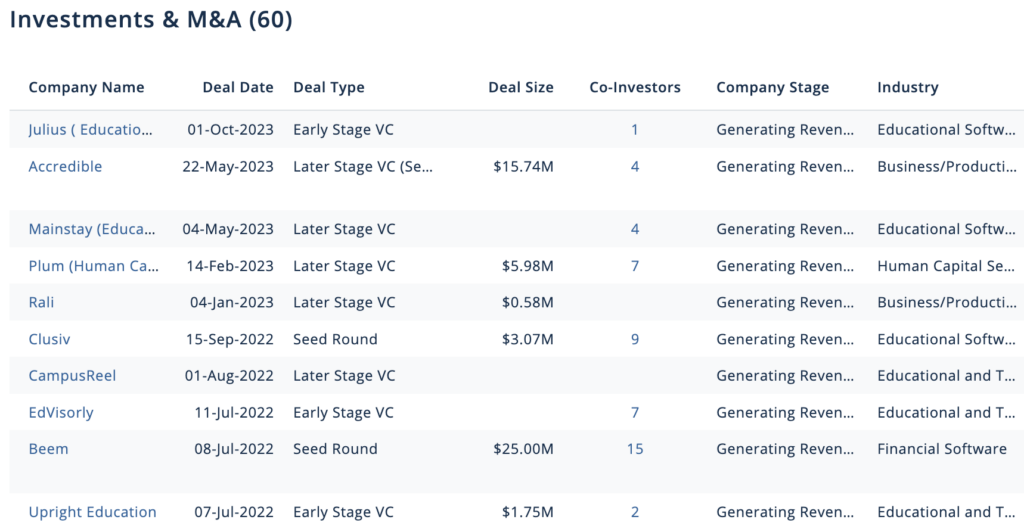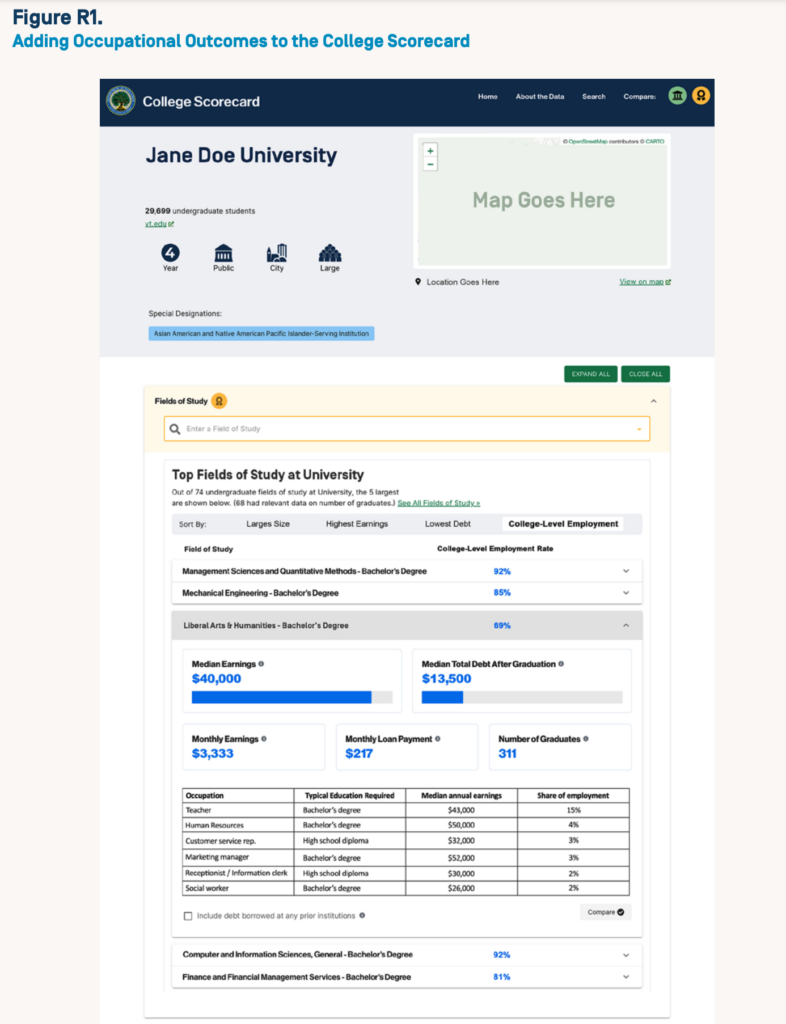The Purpose of Education according to EdTech investors: the case of Strada Education Foundation investment in digital credential platforms
In week 6 of the Critical Issues in Digital Education course, we are invited to reflect on the political structures behind EdTech investments and how venture capital funds, companies, and NGOs that are investing in educational technologies are articulating their view on the purpose of education and using their influence to tilt “the playfield” in accordance with their views on what education is and for. For this week’s blog, I will continue looking at the business of digital credentials and how its investors are advancing the discourse of “employability” in higher education (Wheelahan & Moodie, 2021) to frame a certain view on the role of a university as purely a future employee-making machine and thus discipline public higher education to align to this view.
While there is no common definition of what “micro-credentials” or “digital credentials” are, Wheelahan & Moodie (2021) define micro-credentials as “educational awards for learning from around 10% to up to a full academic year but less than a conventional educational award or credential”. Over the last decade, micro-credentials have been used to further the discourse of traditional universities not being fit to meet the needs of the job market and having to adapt to offer a more fragmented market-driven curriculum as well as to legitimize institutions and industries in the private sector that want to be seen as equal or alternative to universities (Watters, 2016)
The two most popular digital credential platforms currently on the market are Credly and Accredible. As discussed in last week’s post, Credly has been recently acquired by Pearson but we can look at the company’s list of foreign investors prior to its acquisition:

Strada Education Foundation investment of $11M in Credly in March 2019 (from pitchbook.com, last accessed on February 23, 2024)
One of its former investors, Strada Education Foundation, made a decision to invest in its competitor, Accredible, shortly after the acquisition of their previous investment (Credly), which highlights the foundation’s particular interest in the business of digital credentials:

Strada Education Foundation investment of $15m in Accredible in May 2023 (from pitchbook.com, last accessed on February 23, 2024)
Strada Education Foundation, formerly known as USA Funds, was the largest guarantor of student loans in the US. In 2017, USA Funds was rebranded as Strada Education Network, and then again in 2023 as Strada Education Foundation following its decision to leave the student loan business in 2016 (it is argued, due to Obama administration changes making the federal government the primary distributor of student loans). Following the change, it has set a new mission to “strengthen connections between postsecondary education and opportunity in the U.S.” and focused on “learning after high school provides equitable pathways to opportunity.”
Looking more closely at the list of investments made in the last 18 months by Strada Education Foundation, we can see that their portfolio includes mostly companies that describe themselves to be in the “educational software” industry. We know that companies that EdTech-specific investors tend to construct and promote their own ideas of education and its future (Davies et al, 2022)

The list of Strada Education Foundation investments in the last 18 months.
When looking at the most recent publications and conversations the representatives of the Strada Education Foundation engage in, we can indeed find that they all have a strong employability discourse focus. At the most popular US EdTech investor event, Strada’s representative Ruth Watkins spoke with Grow with Google founder Lisa Gevelber about how certificates can help graduates to become more “employable”. The most recent report issued by the Strada Education Foundation was released this month titled “Talent Disrupted: Underemployment, College Graduates, and the Way Forward“. One of the recommendations from this report is for policymakers to “develop the ability to measure and report the occupational employment outcomes of college degree programs” and for the Department of Education to “consider adding occupational outcomes information on its college scorecard (Figure R1)”

An example of occupational outcomes added to college scorecard suggested to be made mandatory by the Department of Education in the new Strada Education Foundation report.
To sum up, looking at one of the investors in the two most popular digital credential platforms (Credly and Accredible), we can clearly see how their own view on the role of education and their contribution to the discourse of “employability” in higher education frames a certain problem that micro-credentials are then designed to solve. Thus, public higher education institutions are then disciplined to align their programs to be focused on employability above everything else.
References
- Burning Glass Institute and Strada Institute for the Future of Work. Talent Disrupted: Underemployment, College Graduates, and the Way Forward, 2024. https://stradaeducation.org/wp-content/uploads/2024/02/Talent-Disrupted.pdf
- Davies, H., Eynon, R., Komljenovic, J., Williamson, B. (2022). Investigating the financial power brokers behind EdTech. https://www.researchgate.net/publication/365735596_Investigating_the_financial_power_brokers_behind_EdTech
- Grow With Google’s Lisa Gevelber and Strada Education Foundation’s Ruth Watkins. https://www.asugsvsummit.com/video/grow-with-googles-lisa-gevelber-and-strada-education-foundations-ruth-watkins
- Waters, A. Education Technology and the History of the Future of Credentialing, 2016. https://hackeducation.com/2016/12/14/top-ed-tech-trends-credentials
- Wheelahan, L, Moodie, G. (2021). Analysing micro-credentials in higher education: a Bernsteinian analysis, Journal of Curriculum Studies, 53:2, 212-228. https://doi.org/10.1080/00220272.2021.1887358




Hi there Marta!
I hope you are doing great. How is Lausanne right now? Sorry for missing this blog post! I got confused last week with the course timetable.
I am happy to see that you are quoting Watters! What did you think about her blog? Remember that you can write me emails to answer my comments or directly answer in this comment section.
I would like to begin by stating that you used Pitchbook well to research Strada. Your research led you to have a good set of images that complement your blog! I am also pleased to see that you are embedding PDFs and adding hyperlinks to add value to your blog post.
Remember to link to prior readings if possible. For example, as you mentioned, micro-credential start-ups are working around the “employability” discourse in higher education. Thus, it could be implied that the purpose of education could be qualification in terms of Biesta’s concepts. I guess that socialization could eventually be certified with a micro-credential – even though we know that measuring socio-emotional skills is difficult. But when we arrive at subjectification, can we measure that? Possibly no. But, as you mentioned, “[edtech companies] frame a certain view on the role of a university as purely a future employee-making machine and thus discipline public higher education to align to this view”.
I think that an exciting idea to expand is the relation between higher education, employability and credentials, as your main argument in the blog post is to “continue looking at the business of digital credentials and how its investors are advancing the discourse of “employability” in higher education (Wheelahan & Moodie, 2021) to frame a certain view on the role of a university as purely a future employee-making machine and thus discipline public higher education to align to this view”.
We can expand this relation by tapping two readings. The first one is Seybold’s analysis of Wingards’s Edtech Griftopia (another prior reading). In this blog post, Seybold analyzes how Wingard and other edtech entrepreneurs claim that “The value of the college degree, in my analysis, has reached its peak and is on the wane”. Echoing this trope, Watters demonstrates that accreditation companies also follow that discourse: “The question of employability matters to not-for-profits too. We assume that’s part of the deal that comes with a college diploma. But there has been a growing chorus of voices in recent years – many emanating from Silicon Valley – that college isn’t ‘worth it’”. What type of higher education futures are these companies promoting?
Again, sorry for the delay with this blog post. Keep up the good effort!
Hi Nicolás,
Thank you for your comments!
Lausanne is in no rush to welcome spring this year and is treating us to a third season of winter weather. How’s Colombia? I think I’ve never asked you – which city are you based now there? I myself lived in Barranquilla for 8 months back in 2014.
The delay is no problem, I’ve been struggling to keep up with the pace of posting myself as the end of the semester approaches. Please expect some delay in next weeks’ posts – hope it’s ok!
Thank you for sharing Watters’s blog. It sent me down the rabbit hole of researching her take on digital credentials dating back to the early 2010s. I have to admit, it also made me feel quite hopeless about the future of EdTech and ashamed of being complacent with many of the trends she criticizes. Her final thoughts on keeping this blog and that “There’s no joy in being a Cassandra” connect well to how I feel about the course at this point. Enlighting but also depressing.